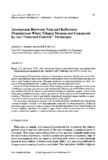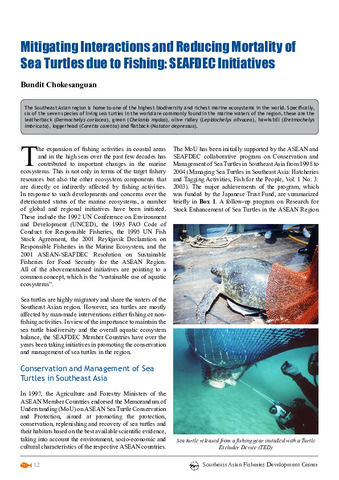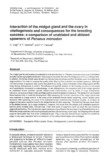Interaction between test and reference populations when tilapia strains are compared by the “internal control” technique
Share
Abstract
Several strains of Oreochromis niloticus, O. mossambicus and their hybrids occur in the Philippines, and others are likely to be introduced or developed locally in the near future. Our objective was to study biological interaction. The paper reports on an experimental design in which "reference" fish are included in each replicate to provide internal statistical control.
Growth of 10 full-sib families from each of two domestic strains was compared. A third strain of red tilapia was mass spawned to provide reference fish. Thirty equal-sized fry from each family were matched with 30 red tilapia fry and reared for 8 weeks in laboratory aquaria. The fish were deliberately crowded to provide a "worst-case scenario" for the application of the reference-strain technique. The objective was to see whether behavioural interaction causes statistical or genotype × environment interactions that create problems in the analysis.
The test strains interacted biologically with the reference strain in different ways: the growth (change in length) of strain 1 only was negatively correlated with reference growth. Statistical interaction did occur in this extreme situation. We speculate that the reference-fish technique will be more useful in experiments in ponds or cages, where variable environmental factors induce positive, rather than negative, correlations between reference and test strains.
Suggested Citation
Basiao, Z. U., & Doyle, R. W. (1990). Interaction between test and reference populations when tilapia strains are compared by the “internal control” technique. Aquaculture , 85(1-4), 207-214. https://doi.org/10.1016/0044-8486(90)90020-N
Subject
Collections
- AQD Journal Articles [1249]
Related items
Showing items related by title, author, creator and subject.
-
Mitigating interactions and reducing mortality of sea turtles due to fishing: SEAFDEC initiatives
Chokesanguan, Bundit (Secretariat, Southeast Asian Fisheries Development Center, 2008) -
Interaction of the midgut gland and the ovary in vitellogenesis and consequences for the breeding success: a comparison of unablated and ablated spawners of Penaeus monodon
Vogt, G.; Quinitio, Emilia T.; Pascual, Felicitas P. (European Aquaculture Society, 1989)The midgut glands and ovaries of unablated and ablated females of Penaeus monodon were examined before and after spawning by light and electron microscopy to elucidate the role of the midgut gland during vitellogenesis. ... -
An Assessment of the Interactions between Species in Multispecies Demersal Fisheries in the Southern Part of the Gulf of Thailand
Sommani, Prichar (Training Department, Southeast Asian Fisheries Development Center, 1987-09)The demersal fisheries in the Gulf of Thailand are a good example of multispecies fisheries which have been studied intensively. Since the early 1960’s, catch per unit of fishing effort (CPUE) statistics, in terms of ...




